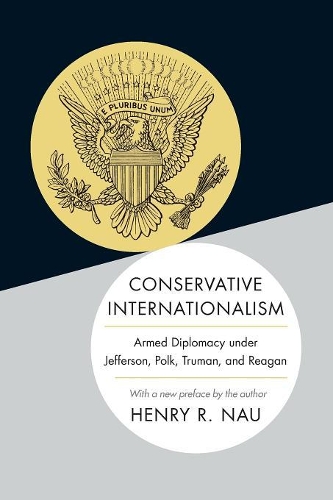
Conservative Internationalism: Armed Diplomacy under Jefferson, Polk, Truman, and Reagan
(Paperback, Revised edition)
Publishing Details
Conservative Internationalism: Armed Diplomacy under Jefferson, Polk, Truman, and Reagan
By (Author) Henry R. Nau
Preface by Henry R. Nau
Princeton University Press
Princeton University Press
2nd November 2015
Revised edition
United States
Classifications
Tertiary Education
Non Fiction
Political science and theory
History of the Americas
327.20973
Physical Properties
Paperback
352
Width 152mm, Height 235mm
510g
Description
Debates about U.S. foreign policy have revolved around three main traditions--liberal internationalism, realism, and nationalism. In this book, distinguished political scientist Henry Nau delves deeply into a fourth, overlooked foreign policy tradition that he calls "conservative internationalism." This approach spreads freedom, like liberal intern
Reviews
"In the wake of Syria-related brinkmanship, it is easy to see, at the moment, how enduringly important it is to manage force in human affairs... [Nau] identifies six traditions in American diplomatic history and connects each to at least one important president whose policies capture the tradition's outlook ... the general reader can learn a good deal."--Wall Street Journal "Nau is interesting, provocative, and sometimes convincing when he looks for signs of conservative internationalism through the long sweep of U.S. history. His description of that school of thought alone makes this book worth reading... This is a valuable way of thinking about U.S. foreign policy for a post-Bush, post-Obama future."--Foreign Affairs "Conservative Internationalism offers a rigorous and thought provoking conceptual look into an important dimension of U.S. foreign policy. It raises in particular the question of whether the literature on American liberal internationalism focuses too much on the 'liberal' and not enough on the 'internationalism.' If so, Nau tilts back the balance here."--Nicolas Bouchet, International Affairs "Throughout this tightly reasoned book, Nau carefully defines relevant terms, identifies the key features and principles of conservative internationalism, and distinguishes it from nationalism, realism, and liberal internationalism... This book would be a solid addition to courses on foreign policy or American politics."--Choice "An important book for 2014, it sets out a manifesto for a classical liberal but non-isolationist approach to foreign policy."--Tyler Cowen, Marginal Revolution "[Nau] has presented a useful reference work for researchers attempting to determine what inspires U.S. presidents to go to war and what dissuades them."--Wes Vernon, Washington Times
Author Bio
Henry R. Nau is professor of political science and international affairs in the Elliott School of International Affairs at George Washington University.
